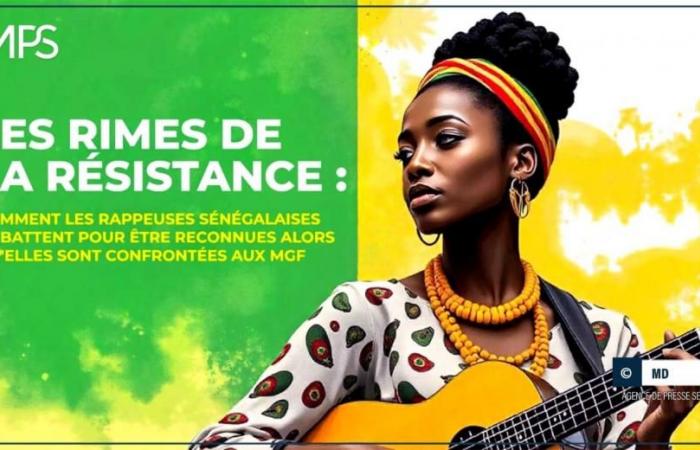Senegalese rap called ”Rap galsen” has also been combined with women since the end of the 90s with pioneers such as Fatim Sy aka ”sista Fa” and Absa Dème “Keisha” who carry the voice of the voiceless, particularly those women.
These two pioneers of the hip hop movement evolve in mixed and committed groups.
Sista Fa is a member of the group ”Wa BMG44” (Wa Bokk Mënmën Guëstu) which literally means “all together to think better” in Wolof. The 44 refers to 1944, the year of the massacre of Senegalese riflemen by France in Thiaroye in the suburbs of Dakar. Keisha is from the group ”Domou Djolof” (son of the country).
Both groups are anchored in their region and direct their music more towards women’s causes and in general on the defects of Senegalese society.
Sista Fa or even young people like Aminata Gaye aka ”Mina la veilée”, Selbe Diouf known under the artist name of ”Sister LB” ”committed feminist” and many others, develop specific themes such as gender-based violence or political problems.
Like Ami Yerewolo from Mali, Natacha Flora Sonloué alias “Nash” from Ivory Coast, Aïcha Bah known as “Ashley” from Guinea (she raps against pedophilia and polygamy), or Kayiri Sylvie Toé alias ”Féenoose”, Burkinabe living in Germany, Senegalese hip hop stars use their music to defend the cause of women and children.
Fatim Sy speaks about “gender-based violence and specifically obstetric fistula, to denounce all these male vices of which women and their offspring are victims”.
”Currently, I work more on violence against women and children,” she confides.
Defending the cause of women and children
Found at the headquarters of the Association of Musical Professions of Senegal (AMS) where she occupies the position of treasurer in the office, Sista Fa underlines the importance of their message in the lives of the populations.
She indicates having participated in awareness campaigns against excision in the regions of Kédougou or Kolda (southern Senegal).
According to several reports, notably those of the American journal of tropical medicine and hygiene of 2015 and that of UNICEF of 2022 entitled genital mutilation in Senegal: results of a statistical study, the region of Kédougou alone recorded a rate 92% of cases of genital mutilation, compared to 88% for Kolda.
Confident of her fight for change, Fatim Sy says she wants to continue this momentum to defend the cause of women and children.
”I’m making an album that talks about female excision, violence against women and children,” she announces.
She cites the example of an association led by the feminist Wasso Tounkara called ”Genji” which is active in the production of such songs.
”In general, many of us denounce these scourges through featuring. We can be four or even five rappers on a song to talk about these themes,” explains the artist, specifying that most of the compositions are made in local languages, to reach everyone.
President of the AMS gender commission, “Sista Fa”, is not only campaigning for equality and fairness within the population, but also for women workers in the music professions.
”Our objective is to assert the rights of women, not only within Senegalese society, but also in the music industry, to enable them to benefit, for example, from maternity leave,” adds -She.
According to her, she and her colleagues in the association decided to denounce subjects that are sometimes taboo in the eyes of society.
”When we tell you that a marabout slept with a 4 or 5 year old child, for example, these are taboo subjects. We made the decision to talk about it,” she suggests.
She adds: ”even if we can have problems, as a mother and a rapper I made the decision to speak for the voiceless, we must do it”.
Finding certain musical genres very folkloric, Sista Fa believes that rap carries a message.
”(…) three or four months ago, while the country was burning (alluding to the electoral process), I made several singles, including one entitled Bu ko sax jéem (don’t even try to do it ), featuring with the “Y en a marre” movement (a group of activist rappers)”, recalls Sista Fa.
This music was, according to the rapper, produced to say “no” to a “third term” of the former President of the Republic of Senegal, Macky Sall.
In her words, she told the former President that he will not get out of this, because Senegal belongs to everyone.
”You won’t get out of this. Senegal is our common business and not private property. You know better than us that you are going to leave power, so there is no need to hide (…)”, chants the one who claims her ”political rap”.
”I’m political. I do political rap. I was part of the biggest groups where people were really afraid of their message (…)”, insists Fatim Sy.
In each song, these women rappers convey messages about gender equality, courage, women’s rights, unlike certain men who very often evoke love or even women in their hits, she notes.
For her part, Sister LB promises success to the woman in her stream entitled ”maa la dig tekk” (I promised you a conversation).
She promises the woman that victory will come, hence her call to never give up.
”You showed me the way and my burden is not heavy. The bumpy road means I see; Spark courage and see what awaits you and I will lead you there,” she argues, thus asking people to have confidence in themselves and to forget their enemies.
”(…) They have this possibility of putting themselves face to face and being able to denounce the defects of society. They have this strength, they have the microphone,” insists the president of the AMS, Daniel Gomes.
Found in his office, he is pleased to see how Sister LB and Sista Fa inspire respect wherever they are invited, thanks to the messages and values they embody.
He underlines the fact that many, at the beginning of Senegalese hip hop, remained stereotypical in their messages.
”Until now, they have still managed not to let themselves be stifled by people who I would call a little retrograde,” he said.
For the vocal lead of the group Oréazul, these women arrived saying that they also have a “right to speak”, after their parents understood the boundaries that should not be crossed in rap.
”I think that if the message is said, it is more so for young people from the generation of 15-20 years ago, who have now become adults,” he explains.
Unlike their brothers, the key words used in their music are often related to promise, fight, victory, and work, among others.
The impact of female rap on society
In front of the private management institute (IPG) located in the popular Liberty 4 district in the Dakar region, Mouhamadou Dior, one of Galsen’s rap music lovers, notes the “positive impact” of the messages delivered by female rappers on Senegalese youth .
”They raise awareness about gender-based violence, about the mistreatment of men, about how we must defend ourselves (…)”, he says.
These rappers, continues Mouhamadou Dior, send messages to motivate others by pushing them not to give in and to denounce the defects of society.
Surrounded by his loved ones, Haruna, a computer science student at the same institute, believes that the messages sent by these women allow us to become “aware and remain more vigilant”. ”They often allow people to become aware and to remain more vigilant in families, to monitor their children more too, because we often hear about cases of rape involving little girls, abuse, etc.”, he emphasizes.






